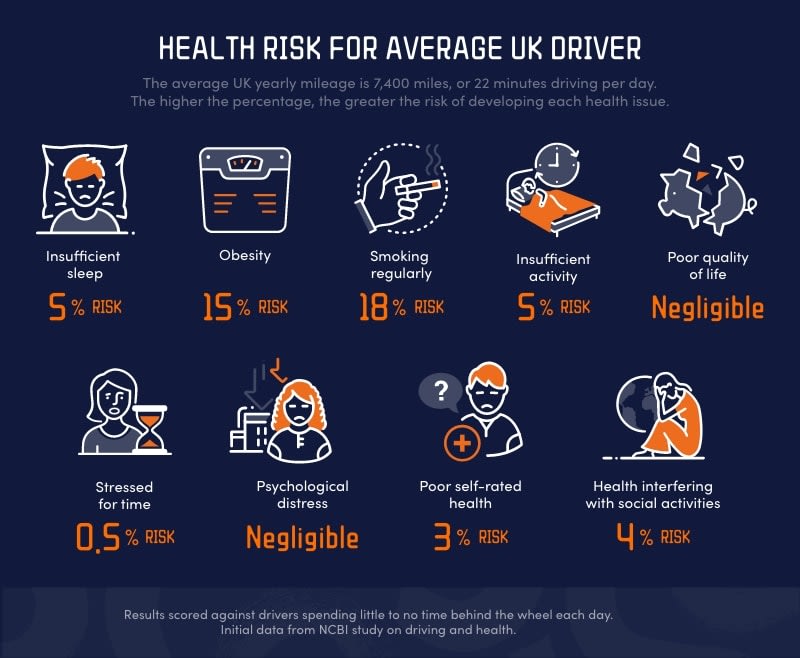In a world of increasing health and safety awareness, it can sometimes seem there’s no way of avoiding risk. Even a desk job, one you might assume is as far from danger as possible, can affect your health through the likes of screen glare and bad posture.
Leaving the office and jumping into your car can also be hazardous. But with mileage and time spent in the car differing greatly from driver to driver, whether you’re a commuter or driver by trade, the risk isn’t one size fits all.
Select’s Driver Health Calculator uses data from a real-world study that explores the link between driving and potential health risks. Using this data along with your personal yearly mileage, you'll be able to gauge your likelihood of developing the associated complications. See for yourself, here!
The average UK driver is at a 15% risk of obesity
The average UK driver – doing 7,400 miles per year, or 22 minutes of driving per day – has a 15% risk of obesity according to our research. They also have a one-in-20 chance of sleep deprivation, caused by the impact that prolonged periods behind the wheel have on the body.
The initial research is from the United States’ National Center for Biotechnology Information (NCBI) and its study on the link between driving time and health issues, which we then cross-referenced with the UK averages for mileage and driving time.
Increasing your mileage to just 12,000 – far from an unrealistic figure, and the equivalent of just 36 minutes of driving each day – raises your obesity risk to 30%, or three in ten. The chances of turning to smoking is also approaching 40%. Use our tool to find out your risk. [Link underlined copy to the dev tool when live]
HGV drivers at a 43% risk of poor quality of life
An annual mileage of little over 20,000, possible for a business motorist, would put you in one of the more at-risk groups. That number of miles would equate to just over an hour of driving every day, which has a huge 50% risk of obesity and even a 13% chance of psychological distress.
That, however, pales in comparison to the potential health complications faced by long-distance HGV driving. On average, lorry drivers do around 125,000 miles per year – equal to 2,500 miles every week and more than six hours of daily driving.
The highest-risk group from the original study covered those spending at least two hours behind the wheel a day – just a third of an HGV driver’s time – and even that put motorists at an alarming level of risk. There’s an 86% risk of sleep deprivation, alongside an eight-in-ten risk of obesity and three-in-ten risk of psychological distress. Overall, HGV drivers have a 43% chance of a poor quality of life.
Five tips for long-distance driving
The health issues above are more likely if the driving is done over prolonged periods, but all drivers – even those doing less than 20 minutes per day – may be susceptible to some degree. Follow our tips below to reduce your risk:
1. Rest up – get plenty sleep the night before a long drive, so your energy levels are good from the off. Caffeine can perk you up if you’re not able to get eight hours in, but this should only be a last resort – we don’t recommend driving unless you’re well rested.
2. Take breaks often – it’s recommended that you take a break of at least 15 minutes for every two to three hours of driving. Not only does this combat tiredness and fatigue, it also allows you to stretch your legs and relieve tension. You should schedule the stops at regular intervals, so you know roughly how long each leg will take.
3. Get lumbar support – an in-car lumbar support can be great for maintaining a healthy posture behind the wheel. Especially over long distances, drivers can begin to slouch without realising, putting pressure on the bones and joints.
4. Take snacks and refreshments – bottled water is recommended for staying hydrated on the move, which can help combat tiredness and keep you alert. The need for a loo break can also encourage regular stops and stretches.
5. Consider a co-pilot – taking others along for the drive can keep fatigue at bay through conversation, but it’s also useful for sharing the driving if they’re licensed and insured.
Methodology
To apply the NCBI findings to UK drivers, we had to establish the link between daily driving time and annual mileage. The average UK driver travels 7,400 miles per year, with the average journey taking 22 minutes – this is the figure we applied as the average daily driving time for a mileage of 7,400.
A user’s inputted mileage is compared with these figures to calculate daily driving time. This places them in one of five risk groups, each with an estimated risk for nine health complications associated with driving.
Enjoyed this? Read more articles similar to this one:
- Elon Musk’s earnings in real time
- The future of cars according to kids
- The James Bond Blueprint - who will be the next Bond?
- The worlds most traffic jammed countries
- Porsche or Porsh-ah? Ultimate guide to mispronounced carmakers
Where To Next?
For all the latest reviews, advice and new car deals, sign up to our newsletter.
Looking for a great leasing deal? Check out our incredible range of special offers.
Read our latest reviews and find the right model for you.
Want to know more about leasing? Take a look at our comprehensive leasing guides.
Interested in everything motoring? Why not catch up on all the latest car leasing news.
















